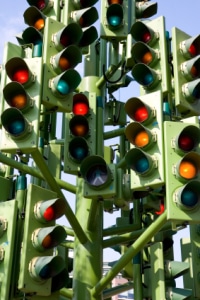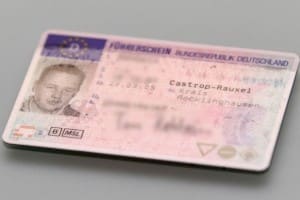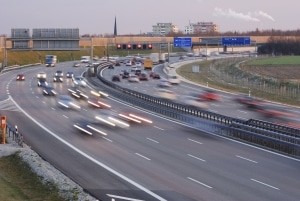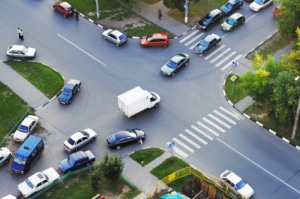German driving laws – fines for speeding, drunk driving, parking etc.
Letzte Aktualisierung am: 16. April 2025
Geschätzte Lesezeit: 10 Minuten
German traffic laws for foreigners

Regarding the question, whether Germans are considerate or rather reckless drivers, everyone will have a different answer after a visit to Germany. That is not surprising considering there are 43 million registered cars in Germany after all. And there are a variety of differences between their drivers. Therefore, the “German driving style” can hardly be evaluated, because there is no such thing as “a German driver”.
According to a recent survey conducted by an insurance company, 96% of all German drivers consider themselves as “very good” or at least “quite good” drivers. Admittedly, the number of traffic deaths is declining every year, but nevertheless, the proportion of traffic deaths in other countries like the UK or the Netherlands is still smaller than in Germany. In spite of that, you can give credit to the Germans that only a sixth of the 43 million car drivers has got so called Punkte in Flensburg (points in Flensburg).
The Flensburger Konto (account in Flensburg) generally records, if someone committed traffic violations like speeding. The bigger the hazard caused by the misbehaviour, the more points will be recorded on the account. If a traffic offender has gathered 8 points, he or she must hand in the driving licence permanently.
Inhaltsverzeichnis:
FAQ: German driving laws
Usually foreign licences are valid in Germany. Depending on how long someone is staying, different laws apply. Please check here for more information.
Yes, in communities the general speed limit is 50 km/h. Information about other speed limits and about fines for violations of those can be found here.
Yes, drunk driving is a traffic violation and from a certain point onwards will be seen as a criminal offence. The general limit is 0,5 ‰ and 0,0 ‰ for drivers under 21 or with a new licence. Check here for more informtion.
The points also apply to foreigners

Under German law, foreigners travelling through Germany are able to collect points in Flensburg as well, if they commit a violation according to the schedule of fines. The rules regarding the points apply to foreigners just like they do to natives. Additional to the points, there are further penalties which can be imposed on foreigners.
- For instance, a fine which is sent as a penalty notice to foreign countries as well. If the recipient does not pay the fine, it will also result in enforcement proceedings – at least in the EU.
- Furthermore, car drivers who committed certain violations like running a red light may be punished with a temporary driving ban which usually lasts for one to three months.
The German schedule of fines is a unified compilation of all German traffic violations and fines according to German driving laws. It also states which additional penalties are imposed on offenders. The schedule of fines defines if the violation entails a driving ban and how long this ban will last. It also determines if points are being recorded and how many.
Furthermore, the German law states that criminal offences like drunk driving can already result in the revocation of the driver’s licence – even if the offender has not gathered 8 points on the account in Flensburg yet. A so called MPU is one of the steps to regain the driver’s permit. It is short for Medizinisch-Psychologische Untersuchung (medical-psychological examination) and requires a report which must attest the offender a more careful driving style in the future. It is often not that easy to receive one. As long as this report is not issued, the offender cannot drive a car in Germany with his or her previous driver’s licence.
In this instance, the traffic offender can lose his or her driving permit abroad as well. The EUCARIS (European Car and Driving Licence Information System) has the data of holders of a driver’s licence from many European countries and provides authorities abroad with it. Thus a driving ban can be enforced there. A general statement if this will happen in other countries is not possible though.
If it happens, there is the possibility that only the violatioin against the regulation of “carrying a driving licence” is punished abroad as sometimes the criminal offence “driving without a driving licence” does not exist in this country.
Revocation of a foreign driving permit
German driving laws allow for two different kinds of driving bans. In the case of a temporary driving ban, the driver’s licence will be revoked as a penalty for a period of up to three months. Afterwards, the holder reacquires it from the authorities. This procedure is also legitimate with a foreign driver’s permit. The ban is usually marked on the concerned licence.
Even if someone is in Germany for just a short time – as a tourist for example – and is punished with a driving ban, the traffic offender cannot unmake it by leaving Germany. The temporary ban prohibits driving in Germany for the defined period of time. If an offender drives during the ban, her or she can be charged with driving without a licence upon re-entry into Germany. This is a criminal offence by German law which is punished with a fine or even a prison sentence of up to one year.
A permanent driving ban for the holder of a foreign driver’s licence is regulated by section 69b in the StGB (German criminal code). It states that the preliminary permission to operate a vehicle in Germany with a foreign driving permit is revoked with the driving ban. Furthermore, it is not possible to get a German driving licence within a retention period set by the authorities.
If the offender is from an EU country, his or her seized driver’s permit will be sent to the appropriate authority in their home country. In some cases, it might even be sent to the home address of the offender. If not, the ban will be noted on the licence itself – the licence then will not be valid anymore in Germany.
Again, if someone drives a car in spite of that, he or she commits a criminal offence. This driving without a licence will not be treated as a traffic violation according to the schedule of fines, but as an offence as per German law. This also means the case will be taken to court. Legal consequences differ from country to country, if you drive without a licence outside of Germany.
Do I need a German driving licence?

Someone who is staying in Germany for extended periods of time and is driving a car here, may want to get a German driving licence. According to German driving laws, this is not necessary if the stay is a short one! The foreign driver’s licence is valid in Germany in the first few months, especially if you are from an EU country. You should check the age limits or time restrictions for the different kinds of licences in Germany. A driver’s licence class C1 and C1E for example needs to be renewed every five years.
Drivers from one of the member states of the EU or a contractual state of the European Economy Area (EEA) will have less problems having their foreign driver’s permit validated in Germany. A translation of the driver’s permit into German is not necessary in these cases. A driver’s licence acquired and issued in such a country will still be valid, if the holder registers a new place of residence in Germany as per German law.
But heads up: the termination date of the driving permit remains valid! Possibly, you have to request an extension with the German authorities. Since the processing will take some time, you should contact the authorities opportunely. You will receive the German documents together with the extension of your driver’s licence, provided that your registered residence is in Germany and you spend at least 185 days a year there.
Driving permits from non-EU countries
So a driver’s licence which was issued within the EU is usually applicable in Germany without any problems. If you have a foreign driver’s permit, though, which was not issued in a EU country nor an EEA country, we strongly advise you to get professional consulting at your local admissions office. According to German driving laws, your current driver’s licence will be valid for the first six months when you have registered a German residency. After that time it will expire. You will have to apply for a German driving licence in due time.
The regulations for acquiring the German driving licence depend on the country the original driver’s licence was issued in. You can find out the regulations for your country at your local driving licence office. Provided that you are not staying longer than a year in Germany, you can get a special permit; thereby you do not have to get a new licence. This special permit must be recorded in your documents; otherwise you might get into trouble at a traffic check.
Speed limits in Germany

Germany has a speed limit of 50 km/h within built-up areas and 100 km/h outside built-up areas – like most European countries. On the other hand, there is no speed limit on the German Autobahn (motorways) – just a recommended speed of 130 km/h. Car drivers are required to drive according to the weather conditions, though. For instance, ice and snow can make it necessary for drivers to drive slower. Consistently, there are heated discussions on establishing a speed limit on the German Autobahn as well. Up to now, this is not the case though.
However, there are traffic signs indicating a speed limit on many street sections and on the motorways as well. Drivers who are speeding in Germany may be caught by a speed trap. The driver must be recognizable on the photo which can be automatically taken by the radar trap. In Germany it is the driver that is liable, which lies in contrast to other countries. Therefore, the registered keeper of the vehicle does not always receive the penalty notice, but it must be undoubtedly clarified on the basis of the photographic evidence that the suspected person was in fact driving.
The following table contains some fines for speeding violations against German driving laws along with the related point and shows if a driving ban is imposed.
German speeding fines
| Out of town | Fine | Points | Driving ban |
|---|---|---|---|
| …1 - 10 km/h | € 20 | ||
| …11 - 15 km/h | € 40 | ||
| …16 - 20 km/h | € 60 | ||
| …21 - 25 km/h | € 70 | 1 | |
| …26 - 30 km/h | € 80 | 1 | 1 month |
| …31 - 40 km/h | € 120 | 1 | 1 month |
| …41 - 50 km/h | € 160 | 2 | 1 month |
| …51 - 60 km/h | € 240 | 2 | 1 month |
| …61 - 70 km/h | € 440 | 2 | 2 months |
| > 70 km/h | € 600 | 2 | 3 months |
| In town | Fine | Points | Driving ban |
|---|---|---|---|
| …1 - 10 km/h | € 30 | ||
| …11 - 15 km/h | € 50 | ||
| …16 - 20 km/h | € 70 | ||
| …21 - 25 km/h | € 80 | 1 | 1 month |
| …26 - 30 km/h | € 100 | 1 | 1 month |
| …31 - 40 km/h | € 160 | 2 | 1 month |
| …41 - 50 km/h | € 200 | 2 | 1 month |
| …51 - 60 km/h | € 280 | 2 | 2 months |
| …61 - 70 km/h | € 480 | 2 | 3 months |
| > 70 km/h | € 680 | 2 | 3 months |
How fines changed due to the new StVO:
| Speeding out of town | Fine: old → new | Points | Driving ban |
|---|---|---|---|
| up to 10 km/h | € 10 → € 20 | - | - |
| 11-15 km/h | € 20 → € 40 | - | - |
| 16-20 km/h | € 30 → € 60 | - | - |
| 21-25 km/h | € 70 → € 100 | 1 | - |
| 26-30 km/h | € 80 → € 150 | 1 | 1 month for repeat offenders |
| 31-40 km/h | € 120 → € 200 | 1 | 1 month for repeat offenders |
| Speeding in town | Fine: old → new | Points | Driving ban |
|---|---|---|---|
| up to 10 km/h | € 15 → € 30 | - | - |
| 11-15 km/h | € 25 → € 50 | - | - |
| 16-20 km/h | € 35 → € 70 | - | - |
| 21-25 km/h | € 80 → € 115 | 1 | - |
| 26-30 km/h | € 100 → € 180 | 1 | 1 month for repeat offenders |
Parking violations

Many tourists do not know the regulations when it comes to parking in Germany. That is not surprising, since there are a lot of rules to follow: it is stated in the StVO (German driving laws) that it is forbidden to park 5 m in front of crossovers or side roads (8 m if there is a cycle path). Lowered kerbs are also off-limits. Moreover, drivers are supposed to park in a space-saving way and must not park in front of a driveway, bus stop signs or on manhole covers. Overall, parking is not allowed in a lot of places pursuant to German driving laws. If these regulations are violated, the driver will get a parking ticket. Parking is permitted at places with a blue traffic sign with a white “P” on it. Sometimes you will have to get a pay-and-display-ticket first, though.
| German Parking Fines | Fines | Points | Driving ban |
|---|---|---|---|
| Parking at unclear road locations, sharp bends, on pedestrian crossings, 5m before / 10m after traffic lights | € 35 | ||
| with obstruction | € 55 | ||
| over 1 hour | € 55 | ||
| over 1 hour with obstruction | € 55 | ||
| Parking on foot- or bicycle paths | € 55 | ||
| with obstruction | € 70 | 1 | |
| over 1 hour | € 70 | 1 | |
| over 1 hour with obstruction | € 80 | 1 | |
| over 1 hour with danger | € 80 | 1 | |
| over 1 hour with accident | € 100 | 1 | |
| Parking on a confined space + obstruction to rescue vehicles | € 100 | 1 | |
| Parking in front of or in fire service access road | € 55 | 1 | |
| obstructs emergency vehicles | € 100 | 1 | |
| Parked on restricted areas in second row | € 55 | ||
| with obstruction | € 80 | 1 | |
| with danger | € 90 | 1 | |
| with accident | € 110 | 1 | |
| over 15 minutes | € 85 | 1 | |
| over 15 minutes with obstruction | € 90 | 1 | |
| Exceeding the parking time by up to 30 minutes | € 20 | ||
| Up to 1 hour | € 25 | ||
| Up to 2 hours | € 30 | ||
| Up to 3 hours | € 35 | ||
| Over 3 hours | € 40 | ||
| Parking on a disabled parking spot | € 55 | ||
| Parking on pedestrian areas or other prohibited zones | € 55 | ||
| with obstruction | € 70 | ||
| over 3 hours | € 70 | ||
| Parking in the travel area of rail vehicles | € 55 | ||
| with obstruction | € 70 | 1 | |
| Parking in places where stopping is prohibited | € 25 | ||
| with obstruction | € 40 | ||
| over 1 hour | € 40 | ||
| over 1 hour with obstruction | € 50 | ||
| Parking on special lanes and at bus stops | € 55 | ||
| with obstruction | € 70 | ||
| with danger | € 80 | ||
| with accident | € 100 | ||
| over 3 hours | € 70 | ||
| over 3 hours with obstruction | € 80 | ||
| over 3 hours with danger | € 100 | ||
| over 3 hours with accident | € 100 | ||
| Unpermissable parking on parking spots for E-Vehicles | € 55 | ||
| Unpermissable parking on parking spots for Carsharing-Vehicles | € 55 |
| German Stopping Fines | Fine | Points | Driving ban |
|---|---|---|---|
| Stopping in narrow or unclear places, on sharp bends, on acceleration or deceleration strips, within five metres of pedestrian crossings, at taxi stands, up to ten metres in front of traffic lights, and where prohibited by markings, traffic lights and road signs | € 20 | ||
| … with an obstruction | € 35 | ||
| Stopping in the second row | € 55 | ||
| … with an obstruction | € 70 | 1 | |
| … with danger | € 80 | 1 | |
| … with accident | € 100 | 1 | |
| Stopping on bicycle lanes | € 55 | ||
| … with an obstruction | € 70 | 1 | |
| … with danger | € 80 | 1 | |
| … with accident | € 100 | 1 | |
| Unpermissable stopping on a bus lane or at bus stops | € 55 | ||
| … with an obstruction | € 70 | ||
| … with danger | € 80 | ||
| … with accident | € 100 |
Safety regulations in the car
It is advisable to equip your car according to the safety regulations before driving in Germany. It can be inspected at a traffic check, if you have
- a reflective vest
- a first aid kid
- a warning triangle
in your car. This equipment is obligatory in Germany just like in most EU countries. Furthermore, the condition of the tyres is sometimes checked as well. The minimum tread depth in Germany is 1.6 mm as per German law; it also is mandatory to have winter tyres, if the weather conditions dictate it.
There is a seatbelt requirement in Germany, too: all passengers must wear a seatbelt while driving. By the way, this also applies to coaches!
Passengers of full age are punished with a fine of € 30, if they do not wear a seatbelt in a moving car. In accordance with German driving laws children smaller than 150 cm have to be double secured: with a seatbelt and a children’s, baby or booster seat. As soon as one of the obligatory safety measures is violated, a fine of € 30 is inflicted. If a child is detected with no safety device whatsoever, the driver will have to pay a fine of € 60 and will get a point in Flensburg. If several children are not secured at all, the fine will increase to € 70.
Drunk driving and drug driving

It is undisputable that the consumption of drugs and alcohol limits the ability to respond. Therefore, the risk to get into a car accident increases enormously. This way, you not only endanger yourself, but also others on the road.
The German alcohol laws and drug laws are very strict, thus the punishment for drunk driving or for driving under the influence of drugs is particularly harsh. The fines go from € 500 to € 1500. Additionally, long driving bans are imposed and multiple points are recorded.
A driver who is caught with 1.1 mg/ml or higher commits a criminal offence and is taken to court. A car driver who is at least 21 years old and has his or her driver’s licence for at least 2 years has a legal alcohol limit of 0.5 mg/ml. There is no traffic violation existent up to this limit, as long as the driving style is not suspicious or endangers others. Adolescents under 21 have a legal limit of 0.0 mg/ml: they are not allowed to drink any alcohol, if they want to operate a vehicle afterwards. The same is valid for new drivers, who have had their licence for less than two years.
The use of marijuana is also prohibited by law in Germany. Therefore, drug driving can not only result in prosecution, but a driving ban as well.
Fines for cyclists and pedestrians
Most of the violations mentioned in the schedule of fines refer to drivers of power-driven vehicles. Pursuant to German driving laws, pedestrians and drivers of non-motorised vehicles can receive a penalty notice as well, though. Cyclists whose bike is not equipped with the proper lighting have to pay a fine of up to € 25. Pedestrians have to pay a warning fine of € 5, if they cross against the red light. Cyclists get a point and a fine of € 60 for this violation. Helmets are not mandatory for cyclists in Germany. By the way, a ride with the bike with over 1.6 mg/ml or a suspicious driving style with at least 0.3 mg/ml can already lead to a criminal charge! Additionally, the offender gets 3 points.
German driving laws are mostly only slightly different to the regulations in other countries. All these sets of rules, like the StVO, are intended for the same thing: increase traffic safety so most accidents can be prevented. Car drivers who are on the road in Germany can do little wrong, when they stick to the prescribed guidelines in section 1 of the StVO: All road and transport users are urged to be considerate of others and drive carefully at all times. Everyone who takes these principles to heart will have no problems while driving in Germany or elsewhere.
Konnten wir Ihnen weiterhelfen? Dann bewerten Sie uns bitte:

 (100 Bewertungen, Durchschnitt: 4,30 von 5)
(100 Bewertungen, Durchschnitt: 4,30 von 5)